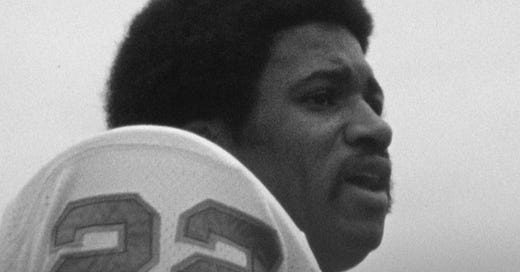Remembrances: Mercury’s Rise After the Fall
Ex-Dolphins Star Mercury Morris, Who Passed Away at 77, Came to Peoria in the Late 1980s to Talk About the Dangers of Drugs
Has there ever been a more aptly named group of running backs than the trio that fueled the Miami Dolphins’ Super Bowl teams of the 1970s?
Larry Csonka. Sounds like a guy who enjoyed running over people.
Jim Kiick. Sounds like a guy who would do exactly that to your backside.
And Mercury Morris. Sounds like the guy eluding and racing away from defenders.
Morris, who passed away this weekend at 77, and Csonka became the first teammates to rush for 1,000 yards in the same season when the 1972 Dolphins went 17-0 and won Super Bowl VII. They nearly pulled off the 1,000-yard feat again the next season when the Dolphins won Super Bowl VIII.
“It’s a very sad day for me and our Dolphin family,” Csonka said in an Associated Press story.
Morris’ life got derailed in the early 1980s and he was sentenced to 20 years in prison for cocaine trafficking. The conviction was overturned in 1986 and Morris got back on track as a motivational speaker. He also wrote a book “Against the Grain” that was published in 1998.
Morris’ run to redemption brought him to Bradley University in the late 1980s for a speaking engagement and a chance to interview him afterward for this story for the Peoria Journal Star.
Morris Cites His Case to Caution Against Drug Use
Mercury Morris has been to both ends of the spectrum in life.
He saw one end as a Miami Dolphins’ running back. He played on two Super Bowl champions. He played in the Pro Bowl and gained 1,000 yards rushing in a season.
He witnessed the other end when all the fame and fortune came down on top of him. He was convicted for attempting to sell cocaine and sentenced to prison on January 20, 1983.
In a program sponsored Tuesday night by the Bradley University Black Student Alliance, Morris spoke, as he told a group of less than 75 people at the Student Center, “about people.” Some of that was related to his problems with drug addiction.
“Mercury Morris was a fool in his life,” Morris said. “In 1974 my mindset was, if you buy a car that goes 150 miles per hour, you might as well go 150.”
Morris is candid in his observation of the problem of drug abuse.
“There is no such thing as drug abuse,” Morris said. “That’s misinformation, because a drug is not an abusable item. With drug abuse, who suffers? It’s not the drug. It’s very simple. It’s self-abuse.
“Self-abuse is what we suffer from in this country. We can only place the blame on one’s self.”
Morris blames no one but himself for his problem that eventually led him to prison.
“I can’t say that it was cocaine’s fault,” he said. “It was my choice and my involvement with cocaine led me to that.”
Morris said he’s not trying to preach to people that they shouldn’t use drugs or should do other things.
“I’m telling you to look at the odds,” he said. “I’m not here to tell you what to do and not what to do. I’m just here to give you some advice.”
Morris was sentenced to a 20-year prison term. He was ineligible for parole for the first 15 years of the sentence.
However, on May 6, 1986 the Florida Supreme Court overturned the lower court’s decision and ruled he had been a victim of entrapment.
Morris said the time he spent in prison made him realize how far he had come from his glory days with the Dolphins.
“I had been to both ends of the spectrum in society,” he said, “And believe me, it’s better right here where we all are tonight.”
Morris said he learned a valuable lesson while in prison from a man in prison for 37 years.
“The guy told me, ‘Morris, when you see yourself going down the wrong road, turn around and come back.’”
Morris also talked about the cocaine-related deaths of basketball star Len Bias and football star Don Rogers in 1986.
“You cannot have two situations like Len Bias and Don Rogers,” he said. “You can’t die of six times the lethal dose of cocaine. You die of the lethal dose.”
Morris also issued a warning to athletes who think about using drugs.
“I’ve got news for you athletes,” he said. “The most vulnerable people to die are athletes. Because they are healthy. Freebasing can do to a healthy heart what it did to those two guys.”
He also said he feels the peer pressure on young people to use drugs is self-inflicted.
“I’ve got a message for young people,” he said. “You do have a choice and it’s yours to make.”
Morris will attempt to tell his story through a book entitled “Against the Grain.” A script for a made-for-TV movie is also in the production process.
“There’s no reason why one involves himself in drugs,” he said. “For every reason one has an excuse. The bottom line is there’s no reason you start. You only have a reason to stop.”




